|

by Daily Mail Reporter
26 September 2011
from
DailyMail Website
|
Findings would disprove Einstein's
theory of relativity.
CERN claims neutrinos went faster than the cosmic speed barrier of
186,282 miles per second
(299,792 kilometers per second).
A neutrino beam fired from a particle accelerator near Geneva to a
lab 454 miles away in Italy traveled 60 nanoseconds faster than the
speed of light |
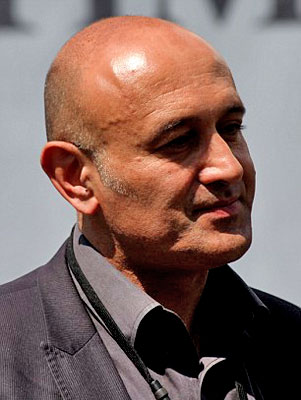
Jim Al-Khalili,
pictured at this year's Cheltenham Science Festival,
has poured
scorn on the claims
Scientists spoke of their disbelief
yesterday over claims that particles have apparently been recorded
travelling faster than the speed of light.
If the calculations are correct, the findings by physicists at the
CERN research centre they have disproved Albert Einstein’s theory of
relativity - the cornerstone of physics.
Subatomic particles called neutrinos were beamed from the
Large Hadron Collider in Switzerland to a laboratory in Italy 454 miles
away, and beat the speed of light by 60 nanoseconds.
But other scientists have dismissed the claims, with one saying he
'would eat his shorts' if they are proved right.
Celebrity scientist Brain Cox was not so dismissive, saying that if
the results are confirmed it would be,
'one of the greatest
scientific discoveries of all time'.
Others were more cynical.
Jim Al-Khalili, Professor of Physics at
the University of Surrey, said:
‘Let me put my money where my mouth
is: if the CERN experiment proves to be correct and neutrinos have
broken the speed of light, I will eat my boxer shorts on live TV.’
The apparent findings raises science fiction scenarios such as
sending information back in time and blurring the line between past
and present.
As experts across the world expressed their shock - and cynicism -
the physicists at CERN insisted they had tested and re-tested the
findings for six months and could not find anything to alter the
result.
If they are right the neutrinos made the journey in 0.0024 seconds,
travelling at 299,798,454 meters per second. (Wikipedia:
speed of light = 299,792,458 meters per second.)
Scientists at he European Organization for Nuclear Research,
CERN,
outside Geneva say they have clocked subatomic particles, called
neutrinos, traveling faster than light
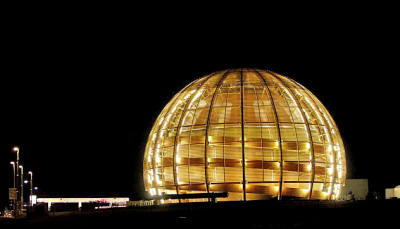
Scientists at he European Organization for Nuclear Research, CERN,
outside Geneva
say they have clocked subatomic particles, called
neutrinos, traveling faster than light
The speed of light in a vacuum is 299,792,458 meters per second,
meaning that the neutrinos completed the distance 60 billionths of a
second faster than light, scientists told a press conference in
Geneva yesterday.
The result is so unprecedented, even the lead researcher Dr
Antonio Ereditato has described it as ‘crazy’ and called on his
colleagues to do the same test and see if it can be replicated.
He said:
‘We tried to find all possible
explanations for this. We wanted to find a mistake - trivial
mistakes, more complicated mistakes or nasty effects. We spent months and months doing
checks and we have not been able to find any.’
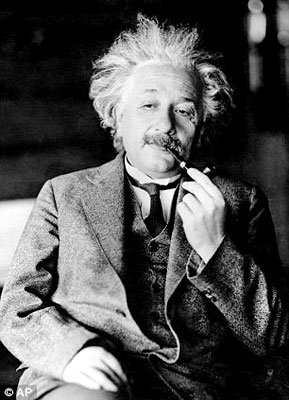
If true, the
findings would break a fundamental pillar of science
and
Einstein's special theory of relativity:
The famous E (equals)
mc2 equation
TV physics professor Brian Cox said if
correct it was a huge discovery which opened the possibility of
time
travel.
‘It’s a very big deal,’ he said. ‘If
you’ve got something travelling faster than light, it requires a
complete re-writing of our understanding of the universe.
‘The reason everyone is cautious is because Einstein’s theory of
special relativity says that nothing can travel faster than the
speed of light and that’s the basis of our understanding of
physics.
‘The reason you can’t build a time machine and go flying around
like Doctor Who into the past is because the speed of light is
protected - it’s the universal speed limit.’
The scientists - who did not set out to
disprove Einstein’s 1905 theory, but were testing other things -
used 16,000 neutrinos, which are tiny, almost weightless particles
produced by nuclear reactions such as the Big Bang or star
formation.
Neutrinos are said to be ‘ghostly’ because they can travel through
anything. Billions of them pass through our bodies every day.
They were beamed through the Earth’s crust from the collider in
Switzerland to a lab in Italy, where vast underground detectors
received them.
One possible reason for the incredible result is a miscalculation in
either the distance or time.
Only another test using a different
path will tell - which could be carried out using colliders in the
U.S. and Japan.
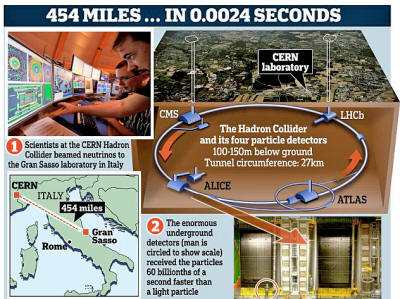
How the Hadron
Collider works
Dr Alan Watson, a physicist at Birmingham University said:
‘It raises the idea that if person A
sends a text to person B, someone travelling quickly in the
other direction could see B receive it before A sends it.’
The institute collaborated with Italy's
Gran Sasso National Laboratory for the experiment at CERN.
Katsanevas said help could also come from the T2K experiment in
Japan, though that is currently on hold after the country's
devastating March 11 earthquake and tsunami.
Scientists agree if the results are confirmed, that it would force a
fundamental rethink of the laws of nature.
Einstein's special relativity theory that says energy equals mass
times the speed of light squared underlies,
'pretty much everything
in modern physics,' said John Ellis, a theoretical physicist at CERN
who was not involved in the experiment. 'It has worked perfectly up
until now.'
He cautioned that the neutrino researchers would have to explain why
similar results weren't detected before, such as when an exploding
star - or supernova - was observed in 1987.
'This would be such a sensational
discovery if it were true that one has to treat it extremely
carefully,' said Ellis.
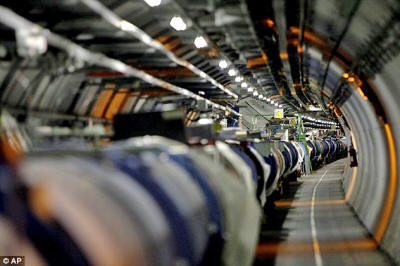
CERN has a
27-kilometer (17-mile) tunnel
in which physicists
shoot particles, seen here in a file photo
|





